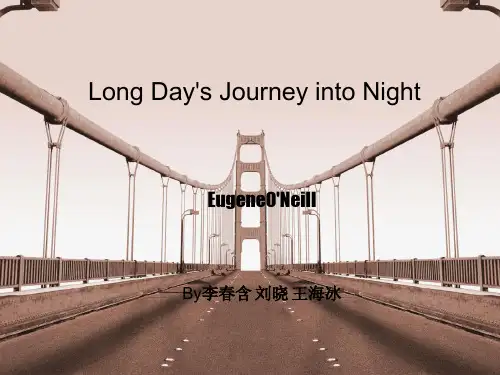Eugene Glastone O'Neill 美国文学史尤金·奥尼尔课件
- 格式:ppt
- 大小:1.04 MB
- 文档页数:21

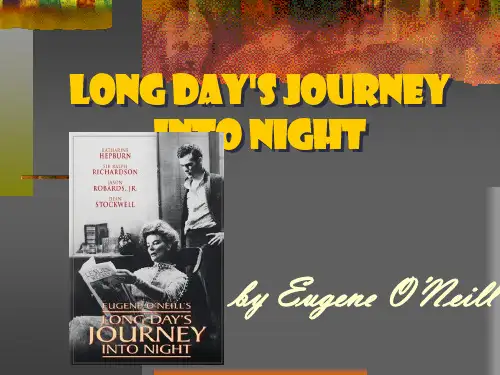
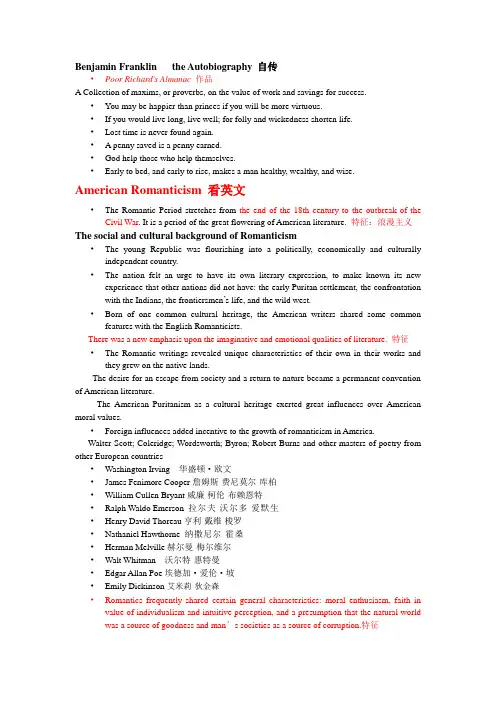
Benjamin Franklin the Autobiography 自传•Poor Richard's Almanac 作品A Collection of maxims, or proverbs, on the value of work and savings for success.•Y ou may be happier than princes if you will be more virtuous.•If you would live long, live well; for folly and wickedness shorten life.•Lost time is never found again.•A penny saved is a penny earned.•God help those who help themselves.•Early to bed, and early to rise, makes a man healthy, wealthy, and wise.American Romanticism 看英文•The Romantic Period stretches from the end of the 18th century to the outbreak of the Civil War. It is a period of the great flowering of American literature. 特征:浪漫主义The social and cultural background of Romanticism•The young Republic was flourishing into a politically, economically and culturally independent country.•The nation felt an urge to have its own literary expression, to make known its new experience that other nations did not have: the early Puritan settlement, the confrontation with the Indians, the frontiersmen’s life, and the wild west.•Born of one common cultural heritage, the American writers shared some common features with the English Romanticists.There was a new emphasis upon the imaginative and emotional qualities of literature. 特征•The Romantic writings revealed unique characteristics of their own in their works and they grew on the native lands.The desire for an escape from society and a return to nature became a permanent convention of American literature.The American Puritanism as a cultural heritage exerted great influences over American moral values.•Foreign influences added incentive to the growth of romanticism in America.Walter Scott; Coleridge; Wordsworth; Byron; Robert Burns and other masters of poetry from other European countries•Washington Irving 华盛顿·欧文•James Fenimore Cooper詹姆斯·费尼莫尔·库柏•William Cullen Bryant威廉·柯伦·布赖恩特•Ralph Waldo Emerson 拉尔夫·沃尔多·爱默生•Henry David Thoreau亨利·戴维·梭罗•Nathaniel Hawthorne 纳撒尼尔·霍桑•Herman Melville赫尔曼·梅尔维尔•Walt Whitman 沃尔特·惠特曼•Edgar Allan Poe埃德加·爱伦·坡•Emily Dickinson艾米莉·狄金森•Romantics frequently shared certain general characteristics: moral enthusiasm, faith in value of individualism and intuitive perception, and a presumption that the natural world was a source of goodness and man’s societies as a source of corruption.特征W ashington Irving华盛顿·欧文Father of American literatu re.Irving’s life•He was one of the first American writers to earn an international reputation, and regarded as an early Romantic writer in the American literary history andThe Sketch Book《见闻札记》Rip V an Winkle 《瑞普·凡·温克尔》The Legend of Sleepy Hollow《睡谷的传说》Edgar Allan Poe 埃德加·爱伦·坡Poet, short story writer and literary critic (48 poems, 70 short stories)•The Raven 《乌鸦》•Annabel Lee《安娜贝尔·李》•T o Helen《致海伦》•The Fall of the House of Usher•Ligeia•The Cask of AmontilladoThe Poetic Principle•The poem, should be short, readable at one sitting•beauty (the rhythmical creation of beauty)•melancholy (especially the death of a beautiful woman)•He greatly influenced the devotees of “Art for art’s sake‖.•He was father of psychoanalytic criticism, and the detective story.Gothic Building/// Gothic NovelRalph Waldo Emerson 艾默生The chief spokesman of New England T ranscendentalism 新英格兰超验主义新英格兰是位于美国大陆东北角、濒临大西洋、毗邻加拿大的区域。
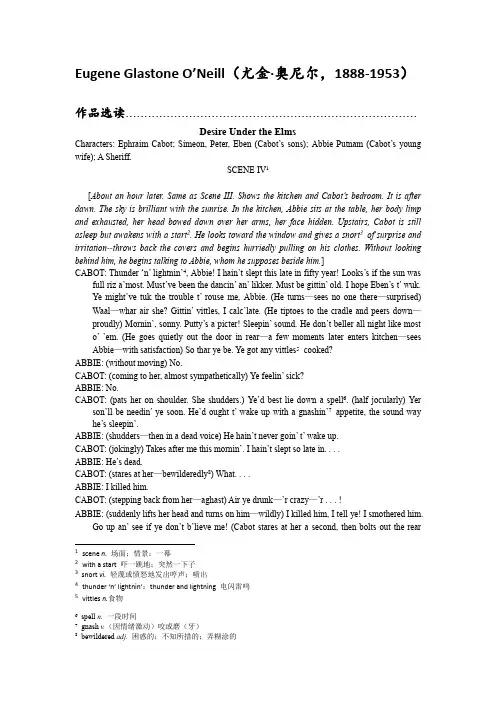
Eugene Glastone O’Neill(尤金·奥尼尔,1888-1953)作品选读..............................................................................Desire Under the ElmsCharacters: Ephraim Cabot; Simeon, Peter, Eben (Cabot‟s sons); Abbie Putnam (Cabot‟s young wife); A Sheriff.SCENE IV1[About an hour later. Same as Scene III. Shows the kitchen and Cabot’s bedroom. It is after dawn. The sky is brilliant with the sunrise. In the kitchen, Abbie sits at the table, her body limp and exhausted, her head bowed down over her arms, her face hidden. Upstairs, Cabot is still asleep but awakens with a start2. He looks toward the window and gives a snort3of surprise and irritation--throws back the covers and begins hurriedly pulling on his clothes. Without looking behind him, he begins talking to Abbie, whom he supposes beside him.]CABOT: Thunder …n‟ lightnin‟4, Abbie! I hain‟t slept this late in fifty year! Looks‟s if the sun was full riz a‟most. Must‟ve been the dancin‟ an‟ likker. Must be gittin‟ old. I hope Eben‟s t‟ wuk.Ye might‟ve tuk the trouble t‟ rouse me, Abbie. (He turns—sees no one there—surprised) Waal—whar air she? Gittin‟vittles, I calc‟late. (He tiptoes to the cradle and peers down—prou dly) Mornin‟, sonny. Putty‟s a picter! Sleepin‟ sound. He don‟t beller all night like most o‟ ‟em. (He goes quietly out the door in rear—a few moments later enters kitchen—sees Abbie—with satisfaction) So thar ye be. Ye got any vittles5cooked?ABBIE: (without moving) No.CABOT: (coming to her, almost sympathetically) Ye feelin‟ sick?ABBIE: No.CABOT: (pats her on shoulder. She shudders.) Ye‟d best lie down a spell6. (half jocularly) Yer son‟ll be needin‟ ye soon. He‟d ought t‟ wake up with a gnashin‟7appetite, the sound way he‟s sleepin‟.ABBIE: (shudders—then in a dead voice) He hain‟t never goin‟ t‟ wake up.CABOT: (jokingly) Takes after me this mornin‟. I hain‟t slept so late in. . . .ABBIE: He‟s dead.CABOT: (stares at her—bewilderedly8) What. . . .ABBIE: I killed him.CABOT: (stepping back from her—aghast) Air ye drunk—‟r crazy—‟r . . . !ABBIE: (suddenly lifts her head and turns on him—wildly) I killed him, I tell ye! I smothered him.Go up an‟ see if ye don‟t b‟lieve me! (Cabot stares at her a second, then bolts out the rear1scene n.场面;情景;一幕2with a start 吓一跳地;突然一下子3snort vi. 轻蔑或愤怒地发出哼声;喷出4t hunder ‘n’ lightnin’:thunder and lightning 电闪雷鸣5vittles n.食物6spell n. 一段时间7gnash v.(因情绪激动)咬或磨(牙)8bewildered adj. 困惑的;不知所措的;弄糊涂的door, can be heard bounding up the stairs, and rushes into the bedroom and over to the cradle.Abbie has sunk back lifelessly into her former position. Cabot puts his hand down on the body in the crib. An expression of fear and horror comes over his face.)CABOT: (shrinking away—tremblingly) God A‟mighty! God A‟mighty. (He stumbles out the door —in a short while returns to the kitchen—comes to Abbie, the stunned expression still on his face—hoarsely) Why did ye do it? Why? (A s she doesn‟t answer, he grabs her violently by the shoulder and shakes her.) I ax ye why ye done it! Ye‟d better tell me ‟r . . . 9!ABBIE: (gives him a furious push which sends him staggering10back and springs to her feet—with wild rage and hatred) Don‟t ye dare tech me! What right hev ye t‟ question me ‟bout him?He wa‟n‟t yewr son! Think I‟d have a son by yew? I‟d die fust! I hate the sight o‟ ye an‟ allus did! It‟s yew I should‟ve murdered11, if I‟d had good sense! I hate ye! I love Eben. I did from the fust12. An‟ he was Eben‟s son—mine an‟ Eben's—not your‟n!CABOT: (stands looking at her dazedly—a pause—finding his words with an effort—dully) That was it—what I felt—pokin‟ ‟round the corners—while ye lied—holdin‟ yerself from me—sayin‟ ye‟d a‟ready conc eived—(He lapses into13crushed silence—then with a strange emotion) He‟s dead, sart‟n. I felt his heart. Pore little critter14! (He blinks back one tear, wiping his sleeve across his nose.)ABBIE: (hysterically) Don‟t ye! Don‟t ye! (She sobs unrestrainedly.)CABOT: (with a concentrated effort that stiffens his body into a rigid line and hardens his face into a stony mask—through his teeth to himself) I got t‟ be—like a stone—a rock o‟ jedgment!(A pause. He gets complete control over himself—h arshly) If he was Eben‟s, I be glad he airgone! An‟ mebbe I suspicioned it all along. I felt they was somethin‟ onnateral—somewhars —the house got so lonesome—an‟ cold—drivin‟ me down t‟ the barn—t‟ the beasts o‟ the field. . . . Ay-eh. I must‟ve suspicion ed—somethin‟. Ye didn‟t fool me—not altogether, leastways—I'm too old a bird—growin‟ ripe on the bough. . . . (He becomes aware he is wandering, straightens again, looks at Abbie with a cruel grin.) So ye‟d liked t‟ hev murdered me ‟stead o‟ him, would ye?Waal, I‟ll live to a hundred! I‟ll live t‟ see ye hung! I'll deliver ye up t‟ the jedgment o‟ God an‟ the law! I‟ll git the Sheriff now. (starts for the door)ABBIE: (dully) Ye needn‟t. Eben‟s gone fur him.CABOT: (amazed) Eben—gone fur the Sheriff?ABBIE: Ay-eh.CABOT: T‟ inform agen ye?ABBIE: Ay-eh.CABOT: (considers this—a pause—then in a hard voice) Waal, I‟m thankful fur him savin‟ me the trouble. I‟ll git t‟ wuk. (He goes to the door—then turns—in a voice full of strange emotion) He‟d ought t' been my son, Abbie. Ye‟d ought t‟ loved me. I‟m a man. If ye‟d loved me, I‟d never told no Sheriff on ye no matter what ye did, if they was t‟ brile me alive!ABBIE: (defensively) They‟s more to it nor yew know, makes him tell.CABOT: (dryly) Fur yewr sake, I hope they be. (He goes out—comes around to the gate—stares up at the sky. His control relaxes. For a moment he is old and weary. He murmurs9ax: ask; ye: you; ‟r: or10stagger vt. 蹒跚;使交错;使犹豫11murder vt.谋杀,凶杀12fust: first; from the fust: from the first13lapse into陷入14critter n. 人;家畜;马;牛despairingly15) God A‟mighty, I be lonesomer16‟n ever! (He hears running footsteps from the left, immediately is himself again. Eben runs in, panting exhaustedly, wild-eyed and mad looking. He lurches17through the gate. Cabot grabs him by the shoulder. Eben stares at him dumbly.) Did ye tell the Sheriff?EBEN: (nodding stupidly) Ay-eh.CABOT: (gives him a push away that sends him sprawling18—laughing with withering contempt) Good fur ye! A prime chip o‟ yer Maw ye be! (He goes toward the barn, laughing harshly.Eben scrambles19to his feet. Suddenly Cabot turns—grimly threatening) Git off this farm when the Sheriff takes her—or, by God, he‟ll have t‟ come back an‟ git me fur murder, too!(He stalks off. Eben does not appear to have heard him. He runs to the door and comes into the kitchen. Abbie looks up with a cry of anguished joy. Eben stumbles over and throws himself on his knees beside her—sobbing brokenly)EBEN: Fergive20me!ABBIE: (happily) Eben! (She kisses him and pulls his head over against her breast.)EBEN: I love ye! Fergive me!ABBIE: (ecstatically) I‟d fergive ye all the sins in hell fur sayin‟ that! (She kisses h is head, pressing it to her with a fierce passion of possession.)EBEN: (brokenly) But I told the Sheriff. He‟s comin‟ fur ye!ABBIE: I kin b‟ar what happens t‟ me—now!EBEN: I woke him up. I told him. He says, wait till I git dressed. I was waiting. I got to thinkin‟ o‟ yew. I got to thinkin‟ how I‟d loved ye. It hurt like somethin‟ was bustin‟ in my chest an‟ head.I got t‟ cryin‟. I knowed sudden I loved ye yet, an‟ allus would love ye!ABBIE: (caressing21his hair—tenderly) My boy, hain‟t ye?EBEN: I beg un t‟ run back. I cut across the fields an‟ through the woods. I thought ye might have time t‟ run away—with me—an‟. . . .ABBIE: (shaking her head) I got t‟ take my punishment—t‟ pay fur my sin.EBEN: Then I want t‟ share it with ye.ABBIE: Ye didn‟t do nothin‟.EBEN: I put it in yer head. I wisht he was dead! I as much as urged ye t‟ do it!ABBIE: No. It was me alone!EBEN: I‟m as guilty as yew be! He was the child o‟ our sin.ABBIE: (lifting her head as if defying22God) I don‟t repent that sin! I hain‟t askin‟ God t‟ fergive that!EBEN: Nor me—but it led up t‟ the other—an‟ the murder ye did, ye did ‟count o‟ me—an‟ it‟s my murder, too, I‟ll tell the Sheriff—an‟ if ye deny it, I'll say we planned it t‟gether—an‟ they‟ll all b‟lieve me, fur they suspicion everythin‟ we‟ve done, an‟ it‟ll seem likely an‟ true to 'em.An‟ it is true—way down. I did help ye—somehow.ABBIE: (laying her head on his—sobbing) No! I don't want yew t‟ suffer!15despairingly adv. 绝望地;自暴自弃地16lonesomer: lonesome adj. 寂寞的;人迹稀少的17lurch n. 突然倾斜;蹒跚;18sprawl v. 蔓延;伸开手足躺19scramble vt.攀登;爬行20Fergive: forgive vt. 原谅;21caress vt.爱抚,抚抱22defy vt. 藐视;公然反抗EBEN: I got t‟ pay fur my part o‟ the sin! An‟ I'd suffer wuss leavin‟ ye, goin‟ West, thinkin‟ o‟ ye day an‟ night, bein‟ out when yew was in—(lowering his voice) ‟R bein‟ alive when yew was dead. (a pause) I want t‟ share with ye, Abbie—prison ‟r death …r hell ‟r anythin‟! (He looks into her eyes and forces a trembling sm ile.) If I‟m sharin‟ with ye, I won‟t feel lonesome, leastways.ABBIE: (weakly) Eben! I won‟t let ye! I can‟t let ye!EBEN: (kissing her—tenderly) Ye can‟t he‟p yerself. I got ye beat fur once!ABBIE: (forcing a smile—adoringly) I hain‟t beat—s‟long‟s I got ye!EBEN: (hears the sound of feet outside) Ssshh! Listen! They‟ve come t‟ take us!ABBIE: No, it‟s him. Don‟t give him no chance to fight ye, Eben. Don‟t say nothin‟—no matter what he says. An‟ I won‟t, neither. (It is Cabot. He comes up from the b arn in a great state of excitement and strides into the house and then into the kitchen. Eben is kneeling beside Abbie, his arm around her, hers around him. They stare straight ahead.)CABOT: (stares at them, his face hard. A long pause—vindictively23) Ye m ake a slick pair o‟ murderin‟ turtle doves! Ye‟d ought t‟ be both hung on the same limb an‟ left thar t‟ swing in the breeze an' rot—a warnin‟ t‟ old fools like me t‟ b‟ar their lonesomeness alone—an‟ fur young fools like ye t‟ hobble their lust. (A pause. The excitement returns to his face, his eyes snap, he looks a bit crazy.) I couldn‟t work today. I couldn‟t take no interest. T‟ hell with the farm. I‟m leavin‟ it! I‟ve turned the cows an‟ other stock loose. I‟ve druv ‟em into the woods whar they kin be free! By freein‟‟em, I‟m freein‟ myself! I‟m quittin‟ here today! I‟ll set fire t‟ house an‟ barn an‟ watch ‟em burn, an‟ I‟ll leave yer Maw t‟ haunt the ashes, an‟ I'll will the fields back t‟ God, so that nothin‟ human kin never touch ‟em! I‟ll be a-goi n‟ to California—t‟ jine Simeon an‟ Peter—true sons o‟ mine if they be dumb fools—an‟ the Cabots‟ll find Solomon‟s Mines t‟gether! (He suddenly cuts a mad caper.) Whoop! What was the song they sung? “Oh, California! That‟s the land fur me.” (He sings this—then gets on his knees by the floorboard under which the money was hid.) An‟ I‟ll sail thar on one o‟ the finest clippers I kin find! I‟ve got the money! Pity ye didn‟t know whar this was hidden so‟s ye could steal. . . . (He has pulled up the board. He stares—feels—stares again. A pause of dead silence. He slowly turns, slumping into a sitting position on the floor, his eyes like those of a dead fish, his face the sickly green of an attack of nausea. He swallows painfully several times—forces a weak smile at last.) So—ye did steal it!EBEN: (emotionlessly) I swapped it t‟ Sim an‟ Peter fur their share o' the farm—t‟ pay their passage t‟ California.CABOT: (with one sardonic24) Ha! (He begins to recover. Gets slowly to his feet—strangely) I calc‟late God give it to ‟em—not yew! God's hard, not easy! Mebbe they‟s easy gold in the West, but it hain‟t God's gold. It hain‟t fur me. I kin hear His voice warnin‟ me agen t‟ be hard an' stay on my farm. I kin see his hand usin‟ Eben t‟ steal t‟ keep me from weakness. I kin feelI be in the palm o‟ His hand, His fingers guidin‟ me. (A pause—then he mutters sadly) It‟sa-goin‟ t‟ be lonesomer now than ever it war afore—an' I'm gittin‟ old, Lord—ripe on the bough. . . . (then stiffening25) Waal—what d‟ye want? God's lonesome, hain‟t He? God's hard an‟ lonesome! (A pause. The sheriff with two men comes up the road from the left. They move cautiously to the door. The sheriff knocks on it with the butt of his pistol.)23vindictively adv. 恶毒地;报复地24sardonic adj.讽刺的;嘲笑的,冷笑的25stiffen v.变硬;变猛烈SHERIFF: Open in the name o‟ the law! (They start.)CABOT: They‟ve come fur ye. (He goes to the rear door.) Come in, Jim! (The three men enter.Cabot meets them in doorway.) Jest a minit, Jim. I got ‟em safe here. (The sheriff nods. He and his companions remain in the doorway.)EBEN: (suddenly calls) I lied this m ornin‟, Jim. I helped her do it. Ye kin take me, too.ABBIE: (brokenly) No!CABOT: Take 'em both. (He comes forward—stares at Eben with a trace of grudging admiration.) Putty good—fur yew! Waal, I got t' round up the stock. Good-by.EBEN: Good-by.ABBIE: Good-by. (Cabot turns and strides past the men—comes out and around the corner of the house, his shoulders squared, his face stony, and stalks grimly toward the barn. In the meantime the sheriff and men have come into the room.)SHERIFF: (embarrassedly) Waal—we‟d best start.ABBIE: Wait, (turns to Eben) I love ye, Eben.EBEN: I love ye, Abbie. (They kiss. The three men grin and shuffle embarrassedly. Eben takes Abbie‟s hand. They go out the door in rear, the men following, and come from the house, walking h and in hand to the gate. Eben stops there and points to the sunrise sky.) Sun‟s a-rizin‟. Purty26, hain‟t it?ABBIE: Ay-eh. (They both stand for a moment looking up raptly in attitudes strangely aloof and devout.)SHERIFF: (looking around at the farm enviously—to his companion) It‟s a jim-dandy27farm, no denyin‟. Wished I owned it!(The Curtain Falls)参考译文..............................................................................第四场人物:以法莲·凯勃特;西蒙,彼得,埃本(凯勃特的儿子);爱碧·普特南(凯勃特的年轻妻子);治安官。
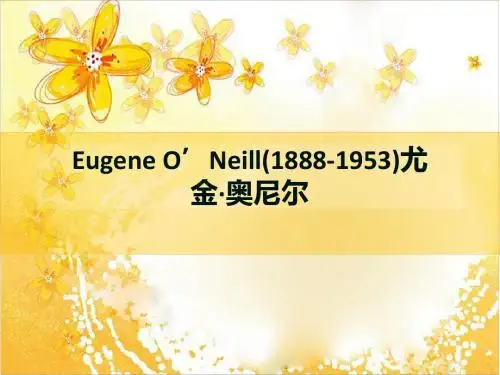
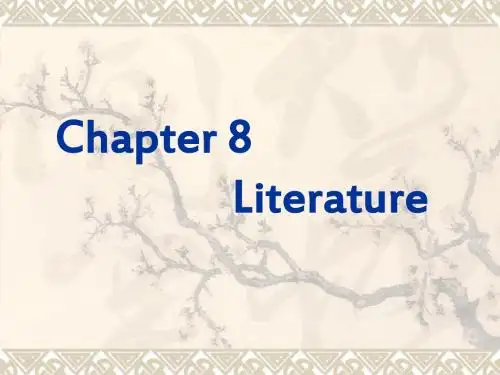

陶洁《美国⽂学选读》(第3版)笔记和课后习题详解(第18单元尤⾦第18单元尤⾦?格拉斯通?奥尼尔18.1复习笔记I.Introduction to author(作者简介)1.Life(⽣平)Eugene Glastone O’Neill(1888-1953)was the greatest playwright of US.He was born in New York.His father was a famous actor and O’Neill traveled around with his father’s group and took a year in Princeton,from which he was expelled because of misbehavior.Then he began his experience of wandering and loafing about which stand him in good stead.In the winterof1912-13he developed tuberculosis and was sent to a sanitarium.In this period he read widely in the world’s dramatic literature.In1916his one-act play Bound East for Cardiff was staged.The event marked the beginning of O’Neill’s long and successful dramatic career and ushered in the modern era of the American Theater.O’Neill was a prize-winning playwright.He received the Pulitzer Prize for his Beyond the Horizon and Anna Christie between1920and1922,and the Nobel Prize in1936.尤⾦·格拉斯通·奥尼尔(1888—1953)是美国最伟⼤的剧作家。

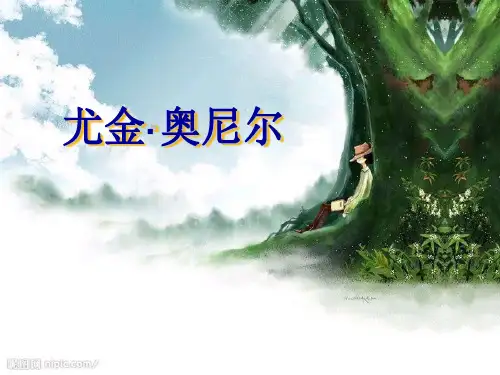
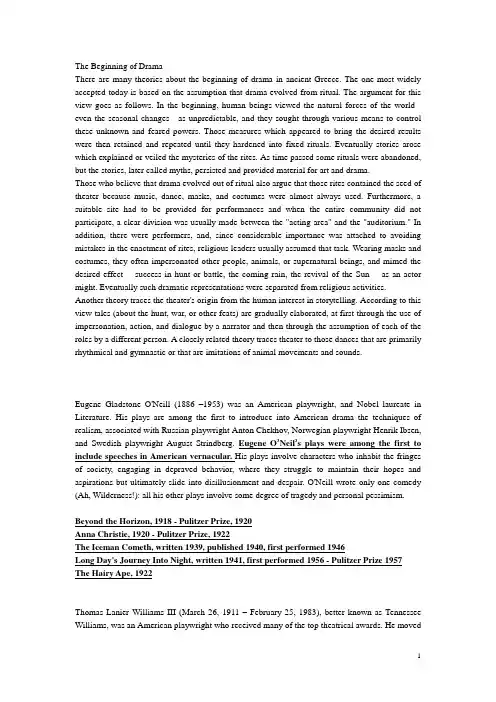
The Beginning of DramaThere are many theories about the beginning of drama in ancient Greece. The one most widely accepted today is based on the assumption that drama evolved from ritual. The argument for this view goes as follows. In the beginning, human beings viewed the natural forces of the world - even the seasonal changes - as unpredictable, and they sought through various means to control these unknown and feared powers. Those measures which appeared to bring the desired results were then retained and repeated until they hardened into fixed rituals. Eventually stories arose which explained or veiled the mysteries of the rites. As time passed some rituals were abandoned, but the stories, later called myths, persisted and provided material for art and drama.Those who believe that drama evolved out of ritual also argue that those rites contained the seed of theater because music, dance, masks, and costumes were almost always used. Furthermore, a suitable site had to be provided for performances and when the entire community did not participate, a clear division was usually made between the "acting area" and the "auditorium." In addition, there were performers, and, since considerable importance was attached to avoiding mistakes in the enactment of rites, religious leaders usually assumed that task. Wearing masks and costumes, they often impersonated other people, animals, or supernatural beings, and mimed the desired effect -- success in hunt or battle, the coming rain, the revival of the Sun -- as an actor might. Eventually such dramatic representations were separated from religious activities. Another theory traces the theater's origin from the human interest in storytelling. According to this view tales (about the hunt, war, or other feats) are gradually elaborated, at first through the use of impersonation, action, and dialogue by a narrator and then through the assumption of each of the roles by a different person. A closely related theory traces theater to those dances that are primarily rhythmical and gymnastic or that are imitations of animal movements and sounds.Eugene Gladstone O'Neill (1886 –1953) was an American playwright, and Nobel laureate in Literature. His plays are among the first to introduce into American drama the techniques of realism, associated with Russian playwright Anton Chekhov, Norwegian playwright Henrik Ibsen, and Swedish playwright August Strindberg. Eugene O’Neil’s plays were among the first to include speeches in American vernacular. His plays involve characters who inhabit the fringes of society, engaging in depraved behavior, where they struggle to maintain their hopes and aspirations but ultimately slide into disillusionment and despair. O'Neill wrote only one comedy (Ah, Wilderness!): all his other plays involve some degree of tragedy and personal pessimism.Beyond the Horizon, 1918 - Pulitzer Prize, 1920Anna Christie, 1920 - Pulitzer Prize, 1922The Iceman Cometh, written 1939, published 1940, first performed 1946Long Day's Journey Into Night, written 1941, first performed 1956 - Pulitzer Prize 1957 The Hairy Ape, 1922Thomas Lanier Williams III (March 26, 1911 – February 25, 1983), better known as Tennessee Williams, was an American playwright who received many of the top theatrical awards. He movedto New Orleans in 1939 and changed his name to "Tennessee," the state of his father's birth. He won the Pulitzer Prize for Drama for A Streetcar Named Desire in 1948 and for Cat on a Hot Tin Roof in 1955. In addition, The Glass Menagerie (1945) and The Night of the Iguana (1961) received New York Drama Critics' Circle Awards. His 1952 play The Rose Tattoo received the Tony Award for best play.Arthur Asher Miller (October 17, 1915 – February 10, 2005) was an American playwright and essayist. He was a prominent figure in American literature and cinema for over 61 years, writing a wide variety of plays, including celebrated plays such asThe Crucible, A View from the Bridge, All My Sons, and Death of a Salesman,which are still studied[1] and performed[2] worldwide. Miller was often in the public eye, most famously for refusing to give evidence against others to the House Un-American Activities Committee, being the recipient of the Pulitzer Prize for Drama among countless other awards, and for his marriage to Marilyn Monroe. Miller is considered by audiences and scholars as one of America's greatest playwrights, and his plays are lauded throughout the world.Edward Franklin Albee III (born March 12, 1928) is a three time Pulitzer Prize winning American playwright known for works including Who's Afraid of Virginia Woolf?, The Zoo Story, The Sandbox and The American Dream. His works are considered well-crafted and often unsympathetic examinations of the modern condition. His early works reflect a mastery and Americanization of the Theatre of the Absurd that found its peak in works by European playwrights such as Jean Genet, Samuel Beckett, and Eugène Ionesco. Younger American playwrights, such as Pulitzer Prize-winner Paula Vogel, credit Albee's daring mix of theatricalism and biting dialogue with helping to reinvent the post-war American theatre in the early 1960s. Albee's dedication to continuing to evolve his voice — as evidenced in later productions such as The Goat: or, Who Is Sylvia? (2000) — also routinely marks him as distinct from other American playwrights of his era.。
